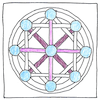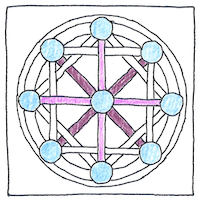Francis Lodwick,
Thomas Urquhart,
George Dalgarno,
Thomas Wilkins,
Gottfried Wilhelm Leibniz
linguistics

|
Philosophical language
In the seventeenth century several tried to construct a language from first principles. Francis Lodwick designed a phonetic alphabet with his own symbols, showing twenty-nine consonants in a table arranged according to the means of their production, one axis being its place of articulation (labial, dental, palatal, velar, sibilant) and the other by its manner of articulation (voiced, voiceless, aspirated, nasal). Then he added fourteen vowels as diacritics. And in 1647 Lodwick advertised a “Perfect Language” whose phonemes signified their places in a taxonomy of all knowledge, “so that two, not knowing each other’s language, could communicate their minds.” Thomas Urquhart proposed an elaborate scheme first described in 1645, again in 1652, and last in 1653, which he called Logopandecteision. He wanted the construction of a word to show its meaning, but also promised the same literal and idiomatic significance, syllable for syllable, as all the words in any natural language. George Dalgarno’s Ars signorum in 1661 was a more systematic attempt to represent everything. Dalgarno’s initial phonemes indicated their places in a taxonomy of ideas, where syllables beginning with O, for example, related to “body” and syllables beginning with Y related to “spirit.” Dalgarno disagreed with John Wilkins, who wanted to have a word for everything. Dalgarno proposed a syllable for only 1068 root words that could be compounded and suffixed for more specificity. John Wilkins’ “An Essay towards a Real Character and a Philosophical Language,” 1668, was a proof-of-concept for a pasigraphy, in which each character represents a concept (totally different from the usual language, in which each character represents a sound). Wilkins thought it would be possible to create a language whose words signified the natures of the ideas and things they represented, so that it would be understandable by anyone regardless of his or her native language. He began with “the Enumeration of things and notions as that they may be full and adequate, without any Redundancy or Deficiency as to the Number of them, and regular as to their Place and Order” assigning each of his forty genera a consonant-vowel pair and adding consonants and vowels to ascend his taxonomic tree. However, such a taxonomy is inevitably limited by ignorance, such as when Wilkins reckons whale and porpoise as species of viviparous oblong fish, or absurdity, such as when Wilkins defends the finite nature of his list by explaining how all species of beasts and their food for a year would fit into Noah’s ark. In 1678, Gottfried Wilhelm Leibniz described his idea of a Lingua generalis with a Characteristica universalis, a philosophical arithmographic language for scientific discourse in which root concepts would be assigned prime numbers all other words would be multiples of these, sentences would be constructed like diagrams, and reasoning would be calculating only the correct answers.
Philosophical hypothesis
The hypothesis that language determines our thoughts or at least influences us has been subject to elaborate tests. Linguists have constructed languages (Loglan, Lojban, Laádan, Ithkuil, and Toki Pona) and people have been instructed to learn them to see if their thought-processes improve. Opposed to this hypothesis is the belief in universal human patterns of perception.
Philosophical questions
Why do philosophical languages fail (except in as much as they inspire further efforts). Why do natural languages grow, change, sprout dialects, and divide? Why do people who profess to believe in the same faith increasingly find reasons to disagree? If I were to invent the perfect system by which individual happiness and world peace were possible, and if it were widely adopted, would people disagree and fight over fine points?



A distinction between a philosophical language and an international auxiliary language can seem artificial, since John Wilkins proposed his “Real Character” to replace Latin as an auxiliary to existing natural languages not only for scholars, but also for diplomats, travelers, and merchants; however, the main difference is that a philosophical language is not derived from existing natural languages, but from philosophical principles.
If you want to understand the value of poetry and the meaning of human life, then think about what these philosophical languages leave out.
See also in The book of science:
Readings in wikipedia:
Other readings: